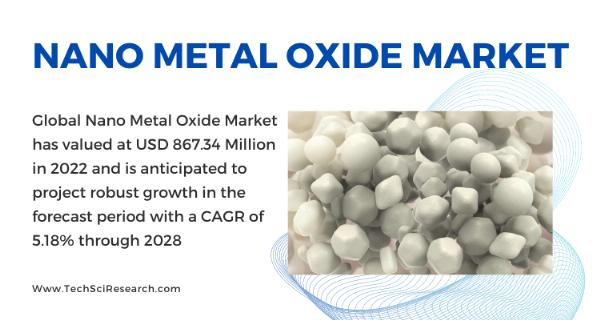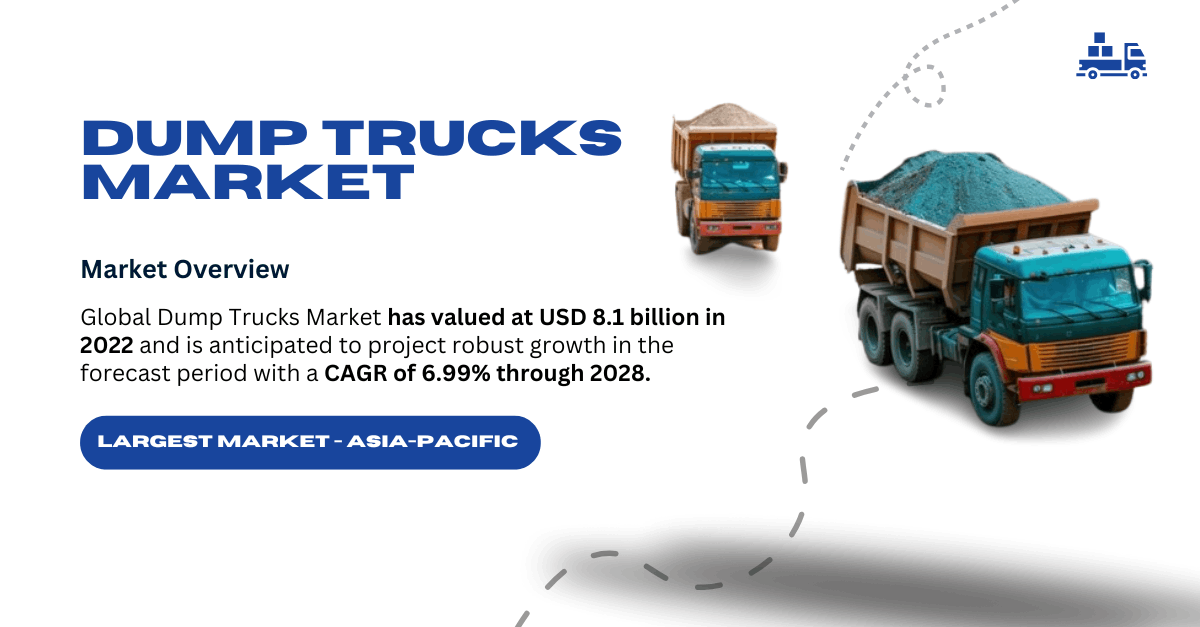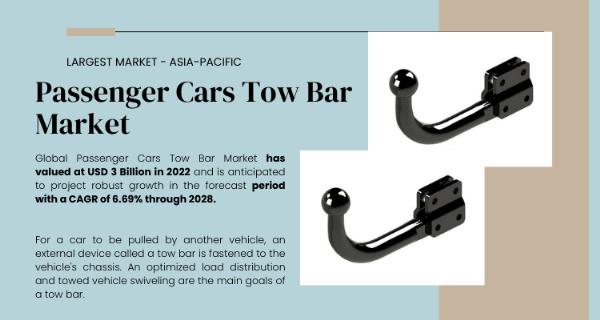Nano Metal Oxide Market Analysis: Valued at USD 867.34 Million in 2022

Strong 8k brings an ultra-HD IPTV experience to your living room and your pocket.
According to TechSci Research report, “Nano Metal Oxide Market – Global Industry Size, Share, Trends, Competition Forecast & Opportunities, 2028”, the Global Nano Metal Oxide Market stood at USD 867.34 million in 2022 and is anticipated to grow with a CAGR of 5.18% in the forecast period, 2024-2028. Nano metal oxide refers to minuscule metal particles encompassing elements like titanium, aluminum, zinc, magnesium, and more.
With a diameter of less than 100 nanometers, it manifests as a white powder derived from the oxidation of zinc oxide particles. Notably, it boasts high catalytic properties and an expansive surface area, finding prevalent application across a spectrum of industries including rubber, paints and coatings, personal care and cosmetics, textiles, and various others.
Nano metal oxides play a crucial role in the manufacturing of a diverse array of microelectronic circuits, encompassing sensors, piezoelectric devices, fuel cells, and more. The escalating requirement for electronic products, including optoelectronics, semiconductors, and transmitters, has translated into a surge in demand for nano metal oxides. Notably, Titanium dioxide (TiO2) semiconductor nanoparticles stand as a significant and promising category of photocatalysts, valued for their distinctive optical and electronic attributes. Concurrently, the increasing utilization of aluminum dioxide as a coating material for optical lenses, windows, flooring, and various surfaces is poised to further augment the overall market demand for nano metal oxides throughout the projected period.
Moreover, nano metal oxides showcase a diverse spectrum of characteristics encompassing UV-blocking capabilities, suspension formation, magnetism, and catalytic properties. These attributes find extensive utility in various sectors such as the production of Portland cement, paints, coatings, sensors, personal care items, and catalysts. The unique features of nanoscale metal oxides also cater to an array of applications, including gas sensors, fuel cells, advanced ceramics, chemical sensors, biosensors, batteries, solar cells, pyroelectric devices, supercapacitors, catalysts, and anti-corrosion coatings. The distinctive properties of nanoscale metal oxides contribute significantly to the advancements and efficacy of these multifaceted applications.
Browse over XX market data Figures spread through XX Pages and an in-depth TOC on the "Nano Metal Oxide Market” @ https://www.techsciresearch.com/report/nano-metal-oxide-market/16697.html
Furthermore, Nanometal oxides possess unique characteristics due to their large surface area-to-volume ratio and unusual catalytic activity, electronic properties, optical properties, and antimicrobial activity. Different types of nanoparticles can be synthesized using various methods.
Global Nano Metal Oxide Market is segmented into product, application, regional distribution, and company
Based on its product, the silicon dioxide segment has emerged as the predominant market leader. The anticipated expansion is a result of the extensive application of SiO2 in the manufacturing processes of paints, plastics, batteries, cosmetics, glass, and rubber.
Additionally, silicon dioxide holds pivotal roles within the realm of biomedical science, serving as a drug carrier and playing an integral role in the composition of electronic devices.
In parallel, the significance of silicon dioxide resonates across industries like optical, construction, and glass, where it finds employment. For instance, the creation of quartz glasses, known for their remarkable resilience to high temperatures, is pivotal in crafting lenses and specialized optical components for advanced equipment. The escalating demand for automobiles is poised to further propel the usage of silicon dioxide, particularly within the tire manufacturing domain.
Furthermore, the application of titanium dioxide spans a broad spectrum, encompassing the formulation of high-factor sun protection lotions, the development of wood preservatives, and the enhancement of textile fibers. Its exceptional capability to safeguard against harmful UV radiation, combined with its innate antibacterial properties, positions it as the preferred ingredient to produce sunscreens and an array of personal care products.
Based on application, the medical & personal care segment commands the highest share of revenue. The escalating demand for cosmetics and personal care products is a driving force in this context. Moreover, the upsurge in investments dedicated to advanced medical treatments, in tandem with the evolution of patient-centric healthcare models, is set to trigger significant funding within the life sciences domain. The arena of personal care products is witnessing a remarkable uptick in sales and noteworthy advancements in formulations.
Items such as sunscreen, moisturizers, and essential makeup products incorporate key ingredients like titanium dioxide, aluminum, and zinc oxide. Nano metal oxides (NMOs) play an instrumental role in elevating effectiveness, enhancing texture, ensuring transparency, and safeguarding the potency of active components within cosmetics. Furthermore, the growing adoption of nano metal oxides by research institutions and various establishments is set to expand the scope of their applications. Elements such as lead, titanium, molybdenum, and iron oxides are extensively harnessed in research endeavors aimed at pioneering environmentally sustainable fuel sources.
Based on region, North America took center stage as the leading contender in the Global Nano Metal Oxide Market. This trend can be ascribed to significant investments in the realm of biomedical engineering, where nano metal oxides play a pivotal role. Moreover, the burgeoning production of automobiles, coupled with substantial investments in the aerospace and defense sectors, is set to galvanize the demand for these materials in the region.
Alongside this, the growing production of automobiles and the infusion of investments in the aerospace and defense sectors are predicted to amplify the global requirement for nanostructured materials. Notably, considerable funding directed towards advancing biomedical engineering in North America is poised to heighten the inclination toward utilizing nanostructured oxides.
Furthermore, Asia Pacific is poised for substantial growth, predominantly due to the prominence of countries like India, China, South Korea, and Indonesia within the region, all of which are experiencing robust economic growth. The escalating population in this geographical area, coupled with improvements in living standards, is expected to propel the demand for cosmetics, electronics, and technologically advanced medical interventions.
Major companies operating in the Global Nano Metal Oxide Market are:
- Nanophase Technologies Corporation
- American Elements
- SkySpring Nanomaterials, Inc.
- Nanoshel LLC
- Abc Nanotech Co., Ltd.
- Nanostructured & Amorphous Materials, Inc.
- Hongwu International Group Ltd
- Nissan Chemical Corporation
- NYACOL Nano Technologies, Inc
- EPRUI Biotech Co. Ltd.
Download Free Sample Report @ https://www.techsciresearch.com/sample-report.aspx?cid=16697
Customers can also request for 10% free customization on this report
“The energy sector is currently experiencing a significant transformation characterized by a shift towards sustainable and highly efficient solutions. In this context, nano metal oxides have emerged as key contributors to this transition. Their utilization extends to energy storage systems, including lithium-ion batteries and supercapacitors, where they play a pivotal role in elevating energy density and optimizing charge-discharge rates. Furthermore, nano metal oxides have found their place in solar cells and catalytic processes, thereby contributing to the advancement of cleaner and more effective energy sources. Moreover, nano metal oxides are also demonstrating notable advancements in the realm of healthcare. Their distinctive attributes are facilitating significant contributions to precise drug delivery, enhanced medical imaging, and innovative antimicrobial applications create a lucrative opportunity in the market growth,” said Mr. Karan Chechi, Research Director with TechSci Research, a research-based management consulting firm.
“Nano Metal Oxide Market - Global Industry Size, Share, Trends, Opportunity, and Forecast, 2018-2028 Segmented By Product (Aluminum Oxide, Iron Oxide, Titanium Dioxide, Silicon Dioxide, Zinc Oxide), By Application (Electronics & optics, Medical & personal care, Paints & coatings, Others), By Region and Competition, has evaluated the future growth potential of Global Nano Metal Oxide Market and provides statistics & information on market size, structure and future market growth. The report intends to provide cutting-edge market intelligence and help decision makers take sound investment decisions. Besides, the report also identifies and analyzes the emerging trends along with essential drivers, challenges, and opportunities in the Global Nano Metal Oxide Market.
You may also read:
Triacetin Market Dynamics- $314.56 Million Valuation and 4.04% CAGR Forecast
Monochloroacetic Acid Market Forecast- Anticipated Expansion with 3.30% CAGR by 2028
Timber Laminating Adhesives Market- Building Bonds with a 5.18% CAGR
Crosslinking Agent Market- Linking for Steady Growth with 4.80% CAGR
Hydrazine Hydrate Market- Exploring the Chemical Powerhouse at $430.15 Million
Table of Content-Nano Metal Oxide Market
- Product Overview
1.1. Market Definition
1.2. Scope of the Market
1.2.1. Markets Covered
1.2.2. Years Considered for Study
1.2.3. Key Market Segmentations
- Research Methodology
2.1. Objective of the Study
2.2. Baseline Methodology
2.3. Key Industry Partners
2.4. Major Association and Secondary Sources
2.5. Forecasting Methodology
2.6. Data Triangulation & Validation
2.7. Assumptions and Limitations
- Executive Summary
3.1. Overview of the Market
3.2. Overview of Key Market Segmentations
3.3. Overview of Key Market Players
3.4. Overview of Key Regions/Countries
3.5. Overview of Market Drivers, Challenges, Trends
- Voice of Customer
- Global Nano Metal Oxide Market Outlook
5.1. Market Size & Forecast
5.1.1. By Value
5.2. Market Share & Forecast
5.2.1. By Product (Aluminum Oxide, Iron Oxide, Titanium Dioxide, Silicon Dioxide, Zinc Oxide)
5.2.2. By Application (Electronics & optics, Medical & personal care, Paints & coatings, Others)
5.2.3. By Region (North America, Europe, Asia Pacific, South America, Middle East & Africa)
5.2.4. By Company (2022)
5.3. Market Map
5.3.1. By Product
5.3.2. By Application
5.3.3. By Region
- North America Nano Metal Oxide Market Outlook
6.1. Market Size & Forecast
6.1.1. By Value
6.2. Market Share & Forecast
6.2.1. By Product
6.2.2. By Application
6.2.3. By Country
6.3. North America: Country Analysis
6.3.1. United States Nano Metal Oxide Market Outlook
6.3.1.1. Market Size & Forecast
6.3.1.1.1. By Value
6.3.1.2. Market Share & Forecast
6.3.1.2.1. By Product
6.3.1.2.2. By Application
6.3.2. Mexico Nano Metal Oxide Market Outlook
6.3.2.1. Market Size & Forecast
6.3.2.1.1. By Value
6.3.2.2. Market Share & Forecast
6.3.2.2.1. By Product
6.3.2.2.2. By Application
6.3.3. Canada Nano Metal Oxide Market Outlook
6.3.3.1. Market Size & Forecast
6.3.3.1.1. By Value
6.3.3.2. Market Share & Forecast
6.3.3.2.1. By Product
6.3.3.2.2. By Application
Note: IndiBlogHub features both user-submitted and editorial content. We do not verify third-party contributions. Read our Disclaimer and Privacy Policyfor details.




![Airbags and Seatbelts Market Growth Forecast: USD 38.16 Billion [USD 38.16 Billion], Projected 7.10% CAGR to 2029](https://indibloghub.com/public/images/courses/67736d4bb9d96584_1735617867.png)


![Vegan Cheese Market Share & Trends: Projected to Reach USD 2.59 Billion [CAGR: 12.7%]](https://indibloghub.com/public/images/courses/675681543c2084383_1733722452.png)